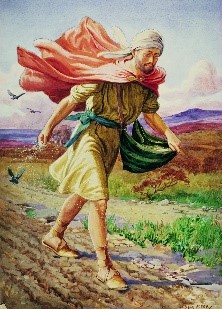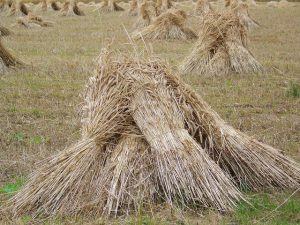 “Let anyone with ears listen!” This Sunday as you prepare for worship, you may wish to read through the gospel passage for today Matthew chapter 13 verses 1-9 and 18-23. Although this is a very well-known parable, we can always find new insights into what it is saying to us as we read it through then listen for God’s word. “Let anyone with ears listen!” Although this is a very well-known parable, we can always find new insights into what it is saying to us as we read it through then listen for God’s word.
“Let anyone with ears listen!” This Sunday as you prepare for worship, you may wish to read through the gospel passage for today Matthew chapter 13 verses 1-9 and 18-23. Although this is a very well-known parable, we can always find new insights into what it is saying to us as we read it through then listen for God’s word. “Let anyone with ears listen!” Although this is a very well-known parable, we can always find new insights into what it is saying to us as we read it through then listen for God’s word.
Today we hear about a farmer who goes out to sow seed. Nothing surprising in that, farmers sow seed all the time. Anyone who knows anything at all about what a plant needs to grow, won’t be surprised to hear that seed cast in the middle of a road, or on the rocks, or amongst thorns, doesn’t grow. However, there is something else so surprising that it should make us sit up and recognise the work of God’s spirit among us and in our world. We know it’s no surprise that the seed in this story, which was cast onto the road, into the rocks and amongst thorns didn’t grow. What is surprising is that the farmer chose to sow it in these places. This isn’t a rich man we are talking about, this is a poor tenant farmer who can only make a living for himself and his family if he not only makes wise choices about where to sow the seed, but also is blessed with good weather and a great deal of luck. Good seed was hard to come by and the wise farmer would make sure that his precious grain goes into the best possible soil. However, the farmer in our parable this morning tosses seed about while standing in the closest thing he can find to a car park at Tesco, where the pigeons will eat it if hundreds of feet and car tires don’t grind it into the ground first. In short, this farmer behaves as though this most precious seed was available in unlimited supply. What on earth is he thinking.
So now comes the real eye-opener, the second surprise in this parable. God blesses the farmer beyond anyone’s wildest dreams. Normally a wise farmer who reaps a twofold harvest would be considered fortunate. A fivefold harvest would be a cause for celebration throughout the village and would be attributable only to the fulness of God’s rich blessing. But this foolish farmer who, in a world of scarcity as it was at that time, casts his seed on soil everyone knows is worthless and is blessed by God with an amazingly abundant harvest. God promises him a harvest of thirty, sixty, and a hundred times what he sowed. “Let anyone with ears listen!”

In this parable of the Sower and the seed, what we must remember is that the Kingdom of God was Jesus’ main emphasis in his ministry. It follows on from chapter twelve where Jesus finally broke away from the synagogue. The passage begins, “That same day Jesus went out of the house and sat beside the lake.” Matthews statement that Jesus went out of the house, actually points to the breaking away of Jesus from the synagogue in chapter twelve. He had ‘left the house’ so to speak because of disagreements with the religious leaders there. The crowd, mentioned in the next verse, represents those who were as yet uncommitted to any denomination or religion and who gathered to hear what Jesus had to say. And so, when Jesus began to speak about the Kingdom of God in his usual illusive way, it was hard to define exactly what the Kingdom was. Even his disciples were baffled and needed an explanation, which is why Jesus told the parable of the Sower and the seed.
We all know the story well, the Sower is God, the seed is the Kingdom and the various types of soil represents us, you and me. When we look at this story, it doesn’t sound as though God is a very frugal farmer. After all, most of the seed never takes root. But this is not really a story about the Sower and the seed, it’s a story about the different types of soil, or to put it another way, the different responses of the people to the message of Jesus about God’s Kingdom. The question for us to ponder is, what is the state of our hearts when the seeds are sown in us?
As we think about that, let’s examine the various conditions of the heart mentioned in this story. The hardened heart: These are the people who listen to the Word of God, but who are so caught up in their own lives, that they have no time to let the words sink in. They think they know best, and no one can tell them any differently, so they close their ears and their hearts.
The distracted heart: These people seem quite keen at the beginning to hear the Word and might even seem to be very excited about it. Then something else enters their lives and they forget the Word. They get caught up in whatever is the latest fad or attraction, and all their attention goes on this.
The defeated heart: People with defeated hearts are those who never really get the chance to listen to the Word. As soon as the Word is spoken, they have someone else whispering in their ear and telling them not to listen. They are easily defeated by others stronger willed than they are and who set out to lead them away from the Word.
And finally, the heart which I hope everyone here today has, The Hopeful heart: This is a heart that is filled with joy every time it listens to the Word of God. People who have hopeful hearts receive the Word of God through reading and listening to scripture. They are people who see the glass as being half full and not half empty. Those who accept the Word of God and hold to it firmly in spite of hardships or distractions, produce abundantly the ‘fruit’ of the Kingdom – that is to say, God’s will is fulfilled in their lives. We all have ears to listen, but do we always listen with joy and hold onto the Word so that we might spread the good news of God’s abundant Kingdom?
In our Gospel passage this morning, Jesus is not only talking about the Kingdom of God and how it is received, but about the growth of that Kingdom. So what is the message we need to hear from a story that suggests that God is like a farmer who tosses seed into car parks for the pigeons to eat, and in the surprising harvest that grows? I think that it says to us that Isaiah’s prophetic word, in our first reading this morning, is coming true. (You may wish to read Isaiah chapter 55 verse 1-2 and 10-13). In the first two verses of chapter 55 (which for some reason are not included in the lectionary), Isaiah says, “Ho, everyone who thirsts, come to the waters; and you that have no money, come, buy and eat! Come, buy wine and milk without money and without price. Why do you spend your money for that which is not bread, and your labour for that which does not satisfy?” ‘Ho,’ in other words, Listen!
What we should realise is that the Kingdom of God has come among us, and we are encouraged to share it with everyone, regardless of who or what they are. Even seed that is sown on what is regarded as worthless ground is not worthless to God. He can and will bless the seed that is sown in everyone’s hearts and will encourage a response to come forth. God has blessed us richly, and God’s people, you and I, have been entrusted with the seed of God’s Word which is the most precious in the world. Ironically, these priceless commodities only gain value – the seed of God’s Word only bears fruit – when God’s people scatter it absolutely heedless of who they think is worthy to receive it. “Let anyone with ears listen!” Amen.
Some reflections for prayer:
Thank God for his abundant blessings in our lives.
Ask God to give us courage to spread the good news of his Kingdom to all we meet.
Pray for God’s harvest to be shared equally among all in every part of our world.
Pray for ‘fertile soil’ to receive the Word of God and to respond to it.
And may God bless you abundantly this coming week.
Moira






